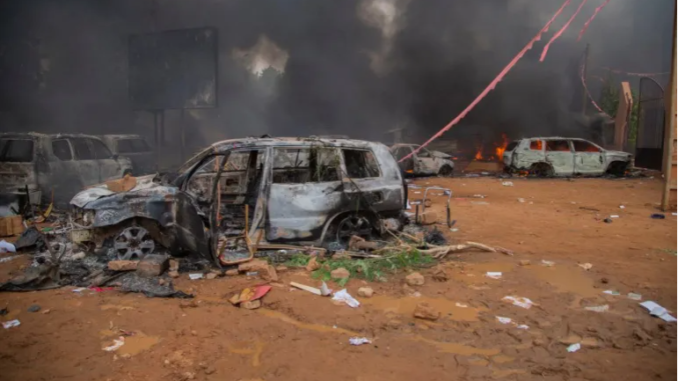
Two days after Niger’s democratically elected President Mohammed Bazoum was detained and removed in a coup led by members of his presidential guard, it was still unclear who was running the country and what mediation efforts were under way.
As of Friday, the soldiers have not announced a leader and Bazoum, who was elected in March 2021 in Niger’s first peaceful, democratic transition since independence from France in 1960, has not resigned.
A statement released on Thursday and signed by army chief Abdou Sidikou Issa pledged support for the coup to avoid a “murderous confrontation” that could lead to a “bloodbath”.
Across the country, tensions remain high between supporters of the coup and people loyal to the president.
In the capital, Niamey, an opposition stronghold, several hundred people on Thursday gathered to chant support for the Russian military group Wagner while waving Russian flags. Later, they burned cars and ransacked the headquarters of the president’s political party.
“We’re fed up,” Omar Issaka, one of the protesters, told The Associated Press news agency.
“We are tired of being targeted by the men in the bush … Down with the French people. We’re going to collaborate with Russia now,” he said.
On Wednesday, soldiers had fired shots to disperse anti-coup protesters who were converging around the presidential palace.
Meanwhile, Bazoum had defiantly declared on Thursday that democracy would prevail in the country, in a statement posted on X, the platform formerly known as Twitter. Foreign Minister Hassoumi Massoudou also spoke on media outlet France 24, urging Nigeriens to stand against the mutiny
There have been no other public communications from the government or the mutinous soldiers or any updates on any mediation discussions.
On Friday, the Economic Community of West African States (ECOWAS) said it would convene an emergency summit of the regional bloc on Sunday in Abuja, Nigeria’s capital.
Earlier this week, Bola Tinubu, Nigeria’s president and ECOWAS chair said he had sent Benin President Patrice Talon to lead mediation efforts, but as of Friday, Talon was not yet in Niger.
Tinubu also had separate calls with United States vice president Kamala Harris and United Nations’ Secretary-General Antonio Guterres about the impasse, state-run Nigerian Television Authority said.
During their first address on Wednesday night, the Nigerien mutineers urged “external partners” not to interfere.
French Foreign Minister Catherine Colonna told French media on Friday that President Emmanuel Macron has spoken several times to Bazoum. Colonna said France believes there are still possible exits from the crisis, and that Paris regards the attempted coup as lacking any legitimacy.
“We call on President Bazoum to be freed,” Macron said on Friday from Papua New Guinea, adding that France supported regional organisations if they decided to impose sanctions against the coup leaders.
Effect on aid
Analysts say the coup could destabilise the country and possibly reshape the international community’s engagement with the Sahel region.
In recent years, Niger has been seen as the last major Western partner standing against armed groups in a region where anti-French sentiment is rising.
Neighbouring Mali and Burkina Faso have both removed the French military, which previously provided aid in their fight against groups linked to al-Qaeda and ISIS/ISIL.
Niger was also seen as offering a more robust response to the conflict compared with the strategies to arm civilians in Burkina Faso or the responsibility given to the Wagner Group in Mali, said Ibrahim Yahaya Ibrahim, senior Sahel analyst for the International Crisis Group.
The country could now lose millions of dollars in military aid and assistance, which the US and European countries have recently pledged in an attempt to help in the fight against the armed groups.
The European Union earlier this year launched a 27-million-euro ($30m) military training mission in Niger. The US has more than 1,000 service personnel in the country. France has 1,500 soldiers, which conduct joint operations with the Nigeriens.
Other analysts like Kwesi Aning, professor of peacekeeping and director of research at the Kofi Annan International Peacekeeping Training Centre in Accra say the coup brings questions about the quality of security assistance to Niger.
“There are about four or five countries all seeking to improve Niger’s capacity to fight the jihadists. They made big promises so what kind of assistance is it that in Mali, failed, Burkina Faso failed and now it has failed in Niger?” he told Al Jazeera on Friday.
“If we are interested in helping four countries deepen democracy, secure stability, and growth, then I think one initiative that is homegrown … that joins the military with developmental intervention must be supported,” added Aning.
For now, as uncertainty lingers about who is in charge in Niger, the insecurity could worsen.
“The army officers will be busy positioning themselves in power struggles and abandon the fight against jihadists,” said Ulf Laessing, head of the Sahel programme at the Konrad Adenauer Foundation.
Rights groups also warn that civilians always bear the brunt of these mutinies.
“During a coup, the first victims are always the same: the most vulnerable, women and children,” said Drissa Traore, secretary-general of the International Federation for Human Rights.
On Thursday, the UN Office for the Coordination of Humanitarian Affairs said it has paused operations in Niger, where more than 370,000 people are internally displaced and more than four million rely on aid.
END

Be the first to comment